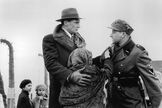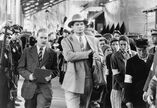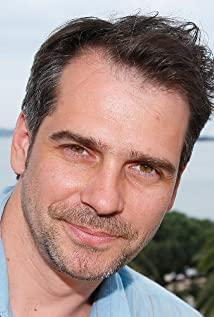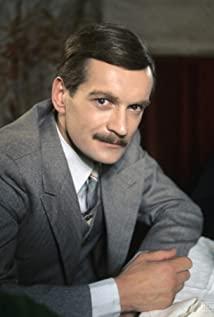Singler's debut revealed his identity through a set of close-ups. The simple and elegant suit shows that he is a middle-class man, a pile of banknotes shows that he is here for money, and the Nazi party emblem shows that he is a member of the Nazi party. A girl in a bright red dress appears twice in the shot, seemingly just passing by, but it reflects Singler's blame for his own incompetence and the humbleness and helplessness of individuals in the era. In the scene where the German army rushed into the city to arrest the Jews, it fully reflected the different choices of people in the face of danger. Those who were caught but disobedient were caught on street corners, shot at will, and killed without blinking an eye. People have no control over their own destiny, and people have no sense of reverence for the souls of others. The turbid world makes the world unbelievable. Have to admit, this is the truth. People panic to find hiding places, but they are not always safe, but this scene is enough to show that living is the most basic pursuit of human beings, and despair will never appear. The woman who had nowhere to hide fled to the street, was found by the little soldier but unexpectedly got help, which reflects the pure love that is not polluted in the dark, as if there is hope for people to see the future. But it also makes people sigh the fact that he will eventually be assimilated. The beautiful music that played at the time of the perilous situation under the city was incompatible with the cruelty of the war. Not a single soldier was shocked by it. They were a pack of wolves who had lost their perception of beauty! Such ferocity ripped apart beauty, and under the mouth of blood, the melody stopped. The performer seems to be fighting against fate and is out of tune with the times, but it is actually an escape. He shuts himself in his own imaginary world and forgets the pain, which is not a wise choice.
It was because of this article that I couldn't help but read it again the next day, not only watching Schindler, but also the young officer Goethe. In fact, Goethe admired Jews in his heart. When he delivered an "inaugural speech" in the square, he said: "Today is a historical moment, and today will be remembered forever. Many years later, young people will talk about today's events with admiration. Today is a historical moment. Six hundred years ago, the great plague in Europe caused countless deaths and Jews were killed. Refers to the disaster, the Polish king at the time approved the Jews to come to Krakow, they came, they came one after another, a carload of luggage, took root, developed, in business, science, education, art and other aspects... They Come empty-handed and have nothing, then prosper. For six centuries, the Jews have occupied Krakow. You might as well think about it, starting from tonight, the deeds of this half century will become rumors and can be regarded as never happened. "Today is a historical moment." He knew very well that the Jews were by no means an "inferior nation", and he knew that what he wanted to do was actually to destroy the Jewish civilization, but he was deeply poisoned by the fascist Nazi ideology and could not extricate himself. He saw the old man who was so skilled at making door hinges in the metalworking factory of the Puisov concentration camp, so he made an excuse to kill him. An excellent female engineer gives architectural advice, and then corrects according to the female engineer's advice after killing it, which is actually a kind of jealousy. He was very conflicted in his heart, especially when facing the maid Helen. Love her but because Helen is Jewish, love and hate are intertwined, and he cannot escape the control of fascist thoughts. In the basement, he told her: "So you hid here to avoid me, and I came to tell you that I am a skilled cook, a skilled servant, and I am sincere. After the war, if you want to write a book, I will „Happy to write for you. Hearing everyone upstairs having fun, it must be lonely here. ", "Sometimes, both of us are lonely", while scolding Helen: "No, how can I sympathize with you? You Jewish bitch, almost tempted me to take the bait..." and then beat Helen frantically. Goethe knew he had fallen in love with Helen, a Jewish woman, a Jewish bitch like a snake, a rat, a worm, and an ant. After Schindler "interpreted" power for the purpose of protecting the Jews, Goethe first tried to be tolerant, but could not escape the fascist nature, and then intensified. Goethe reflected the German soldiers who were deeply poisoned by fascism. They were also human and had love, but they became unable to extricate themselves under the poison of fascism. In the end, Goethe's death is also very ironic. Usually, using power to kill is not only cruel but also for fun. As a result, when he was on the gallows, the soldiers tried to kick the wooden bench under his feet, but it didn't work for a long time. hang. It is "return to the body of others with the way of others". Of course, there are things I don't understand and regret about Schindler's List. Some reasons are not in the film itself. Of course, there are things I don't understand and regret about Schindler's List. Some reasons are not in the film itself. Of course, there are things I don't understand and regret about Schindler's List. Some reasons are not in the film itself.
1. Translation problems. The film is in a lot of German, Polish, Israeli, and possibly Sanskrit, and it's a shame that it wasn't translated. Some of the prayers and songs in the film are very good, it's a pity that they can't be used to understand the film.
2. Prototype problem. Schindler is indeed a person, and he did use the factory to protect many Jews, but he was not as noble as in the film. It is said that he used the Jews he had helped to defraud money in the later period. Although the film is the film, the prototype is the prototype, and the film can be "derived from life and higher than life", thinking of Schindler in his later years in reality, the psychology is somewhat unpleasant.
3. Marital problems. It's totally understandable that the original Schindler's failed marriage was not written in the film, but I think the latter part of the film is too thin when it writes about Schindler's relationship with his girlfriend. In the early stage, I wrote about his lust, which led to his girlfriend. In the later stage, in his hometown, people called his girlfriend Mrs. Shu. The scene of the film is not suitable for the atmosphere, because the audience at that time did not pay attention to the lecherous Schindler, but the human Schindler and the miserable but lucky Jews. Spielberg may not have grasped it well. 4. That paragraph of confession. Schindler put on the ring, but instead of thanking Stan, he said to Stan with tears in his eyes: "Maybe I can take more people out of Poland, maybe I can take more...". Stan said: "By all means As a gift, 1,100 people have survived...". Schindler: "I would have made more money at the time..." He smiled self-deprecatingly, "I was too profligate...". Then, he changed from laughing to crying: "As long as I...". Stan said: "The descendants of the people you saved are also blessed by you." Schindler pointed to his car and said: "This car can be In exchange for the lives of ten people, what am I going to do? Ten people...", took out the collar pin: "This collar pin, two people, made of gold, two people...". He cried aloud, like a child, the workers stepped forward and hugged Schindler, tightly hold him.
Indeed, at such a scene, people with conscience and emotions will be moved, because at this time, everyone will be moved even without this scene. No matter what Schindler says, as long as he says the same thing, or doesn't say it at all, everyone will be moved. . But this paragraph is really a failure. Anyone with a little sense knows that this is sensational, especially when the collar pin is taken out, who believes it. Why is this so, everyone may already be crying, why do you need to add fuel to it. A film that was originally very realistic has become a little hypocritical here. But in any case, this is not a movie you never get tired of watching, but it is definitely a classic movie with thought and historical background. In this film, I admire Spielberg's way of using black and white, so there is a sense of historical weight and realism, and it also symbolizes the dark age of the Jewish people. And at the end, when the Jews who were struggling from the death line were free to go to the town, they used color, which formed a big contrast, and the idea was amazing. The audience has the feeling of walking from the dark to the sun, and can experience the cheerful mood of the people in the play to lift the death threat. In addition, Spielberg's extensive use of dark humor not only makes people laugh, but also makes the audience more sympathetic to the tragic experience of the Jews in those dark years.
View more about Schindler's List reviews











